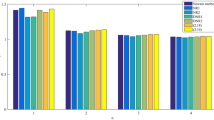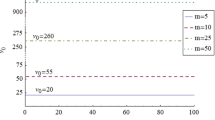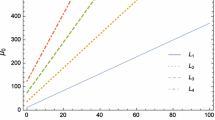Abstract
For solving nonsymmetric linear systems, the well-known GMRES method is considered to be a stable method; however, the work per iteration increases as the number of iterations increases. We consider two new iterative methods GGMRES and MGMRES, which are a generalization and a modification of the GMRES method, respectively. Instead of using a minimization condition as in the derivation of GGMRES, we use a Galerkin condition to derive the MGMRES method. We also introduce another new iterative method, LAN/MGMRES, which is designed to combine the reliability of GMRES with the reduced work of a Lanczos-type method. A computer program has been written based on the use of the LAN/MGMRES algorithm for solving nonsymmetric linear systems arising from certain elliptic problems. Numerical tests are presented comparing this algorithm with some other commonly used iterative algorithms. These preliminary tests of the LAN/MGMRES algorithm show that it is comparable in terms of both the approximate number of iterations and the overall convergence behavior.
Similar content being viewed by others
References
R.O. Abbassian, Lanczos algorithms for the acceleration of nonsymmetrizable iterative methods, Report CNA-193, Center for Numerical Analysis, University of Texas at Austin (1984).
W.E. Arnoldi, The principle of minimized iteration in the solution of the matrix eigenvalue problem, Quart. Appl. Math. 9 (1951) 17–29.
A.M. Bruaset, A Survey of Preconditioned Iterative Methods (Longman Scientific & Technical/ Wiley, New York, 1995).
J.-Y. Chen, Iterative solution of large sparse nonsymmetric linear systems, Report CNA-285, Center for Numerical Analysis, University of Texas at Austin (1997) (Ph.D. thesis, Dept. of Mathematics).
R. Fletcher, Conjugate gradient methods for indefinite systems, in: Proc. of the Dundee Conf. on Numerical Analysis (1975), Lecture Notes in Mathematics, Vol. 506 (Springer, New York, 1976) pp. 73–89.
R.W. Freund and N.M. Nachtigal, QMR: A quasi-minimal residual method for non-Hermitian linear systems, Numer. Math. 60 (1991) 315–339.
M.R. Hestenes and E. Stiefel, Methods of conjugate gradients for solving linear systems, J. Res. National Bureau Standards 49(6) (1952) 409–436.
K.C. Jea, Generalized conjugate gradient acceleration of iterative methods, Report CNA-176, Center for Numerical Analysis, University of Texas at Austin (1982) (Ph.D. thesis, Dept. of Mathematics).
K.C. Jea and D.M. Young, On the simplification of generalized conjugate gradient methods for nonsymmetrizable linear systems, Linear Algebra Appl. 52/53 (1983) 399–417.
Y. Saad, Iterative Methods for Sparse Linear Systems (PWS Publ., Boston, MA, 1996).
Y. Saad and M.H. Schultz, GMRES: A generalized minimal residual algorithm for solving nonsymmetric linear systems, SIAM J. Sci. Statist. Comput. 7(3) (1986) 856–869.
P. Sonneveld, CGS: A fast Lanczos-type solver for nonsymmetric linear systems, SIAM J. Sci. Statist. Comput. 10(1) (1989) 36–52.
H.A. van der Vorst, Bi-CGSTAB: A fast and smoothly converging variant of Bi-CG for the solution of nonsymmetric linear systems, SIAM J. Sci. Statist. Comput. 13(2) (1992) 631–644.
P.K.W. Vinsome, ORTHOMIN: An iterative method for solving sparse sets of simultaneous linear equations, in: 4th Symp. of Numerical Simulation Reservoir Performance, Society of Petroleum Engineers of the AIME, Paper SPE 5739 (1976).
H.F. Walker, Implementation of the GMRES method using Householder transformations, SIAM J. Sci. Comput. 9 (1988) 152–163.
H.F. Walker and L. Zhou, A simpler GMRES, Report, Department of Mathematics and Statistics, Utah State University, Logan, UT (1992).
D.M. Young, L.J. Hayes and K.C. Jea, Generalized conjugate gradient acceleration of iterative methods, Part I: The symmetrizable case, Report CNA-162, Center for Numerical Analysis, University of Texas at Austin (1981).
D.M. Young and K.C. Jea, Generalized conjugate gradient acceleration of nonsymmetrizable iterative methods, Linear Algebra Appl. 34 (1980) 159–194.
D.M. Young and K.C. Jea, Generalized conjugate gradient acceleration of iterative methods, Part II: The nonsymmetrizable case, Report CNA-163, Center for Numerical Analysis, University of Texas at Austin (1981).
Author information
Authors and Affiliations
Rights and permissions
About this article
Cite this article
Chen, JY., Kincaid, D.R. & Young, D.M. Generalizations and modifications of the GMRES iterative method. Numerical Algorithms 21, 119–146 (1999). https://doi.org/10.1023/A:1019105328973
Issue Date:
DOI: https://doi.org/10.1023/A:1019105328973




